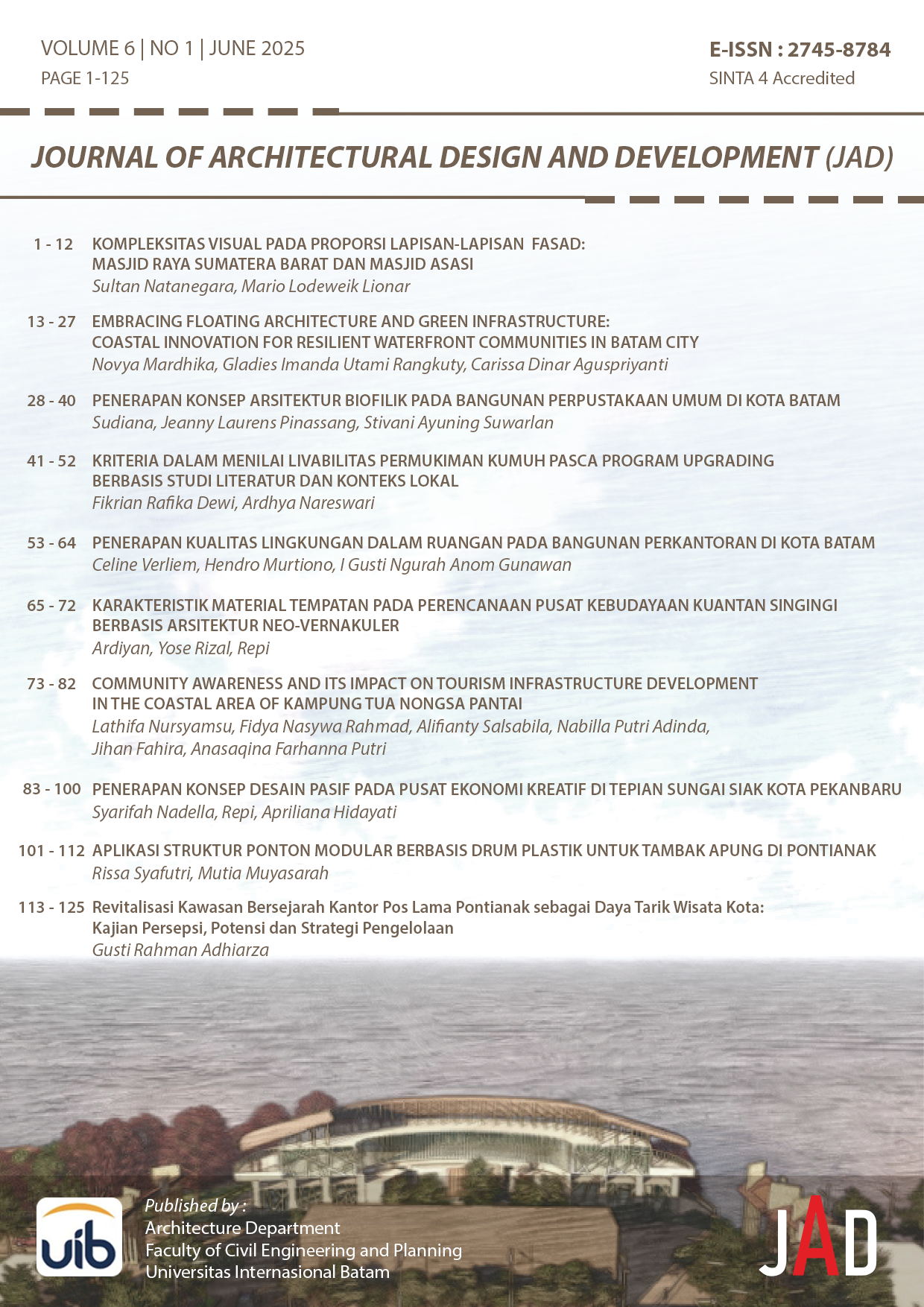COMMUNITY AWARENESS AND ITS IMPACT ON TOURISM INFRASTRUCTURE DEVELOPMENT IN THE COASTAL AREA OF KAMPUNG TUA NONGSA PANTAI
DOI:
https://doi.org/10.37253/jad.v6i1.10390Keywords:
community awareness, tourism infrastructure, coastal heritage, cultural preservation, sustainable tourismAbstract
This study explores the influence of community awareness on the development of tourism infrastructure in Kampung Tua Nongsa Pantai, a coastal heritage village in Batam, Indonesia. Despite its strategic location and rich cultural assets, the area faces challenges in infrastructure development due to limited funding, environmental degradation, and community resistance rooted in cultural preservation concerns. Using a qualitative descriptive approach, data were collected through observations, semi-structured interviews, and document analysis. The findings indicate that community awareness plays a dual role: it can either support or hinder infrastructure development, depending on the perceived alignment with local values and identity. While some residents, particularly elders, expressed concerns about cultural erosion, others, including local leaders and youth, supported infrastructure improvements to enhance tourism opportunities. The study also identified major infrastructure deficiencies such as unsafe access routes, lack of public amenities, and poor waste management. Despite these challenges, grassroots efforts—such as clean-up campaigns and cultural micro-enterprises—demonstrate a growing community commitment to sustainable tourism. This research contributes to the literature on community-based tourism by highlighting the importance of cultural sensitivity and inclusive planning in infrastructure development. Limitations of this study include its focus on a single case study and the constraints of qualitative generalizability. Future research should explore comparative studies across multiple coastal regions and integrate quantitative methods to broaden insights. The study concludes that sustainable tourism development requires not only physical infrastructure but also active and culturally grounded community engagement.
Downloads
References
Hatie, P., & Hay, P. (2012). Qualitative approaches. In Research methods in physical education and youth sport (pp. 79-94). Routledge.
Hiariey, L., & Romeon, N. (2013). Peran serta masyarakat pemanfaat pesisir dalam pengelolaan wilayah Pesisir Teluk Ambon. Jurnal Matematika Sains dan Teknologi, 14(1), 48-61.
Indonesia, P. R. (2009). Undang-Undang Republik Indonesia Nomor 10 Tahun 2009 tentang Kepariwisataan. Jakarta: Lembaran Negara Republik Indonesia.
Indonesia, P. R. (2014). Undang-Undang Republik Indonesia Nomor 1 Tahun 2014 tentang Perubahan atas Undang-Undang Nomor 27 Tahun 2007 tentang Pengelolaan Wilayah Pesisir dan Pulau-Pulau Kecil. Jakarta: Lembaran Negara Republik Indonesia. From Lembaran Negara Republik Indonesia: https://peraturan.bpk.go.id/Home/Details/38618/uu-no-1-tahun-2014
Kay, R., Alder, J., Brown, D., & Houghton, P. (2003). Management cybernetics: a new institutional framework for coastal management. Coastal Management, 31(3), 213-227.
Marton, F., & Booth, S. (2013). Learning and awareness. Routledge.
Nursyamsu, L., & Marcillia, S. (2022). Persepsi terhadap Kondisi Pelestarian Bangunan Cagar Budaya yang Menjadi Atraksi Wisata di Kotagede. ATRIUM: Jurnal Arsitektur, 8(1), 27-42. doi:https://doi.org/10.21460/atrium.v8i1.171
Nursyamsu, L., Gunawan, I., Pinassang, J., Khairi, M., Artanti, N., Caroline, J., & Oliver, A. (2023). Analisis Kepuasan Pengunjung Terhadap Kualitas Infrastruktur Wisata Pantai Kampung Tua Nongsa. Journal of Architectural Design and Development (JAD), 4(2), 179-185.
Oprasmani, E., Amelia, T., & Muhartati, E. (2020). Membangun Masyarakat Peduli Lingkungan Pesisir Melalui Edukasi Kepada Masyarakat Kota Tanjungpinang Terkait Pelestarian Daerah Pesisir. To Maega: Jurnal Pengabdian Masyarakat, 3(2), 66-73.
Sulistyanto, I. (2017). Peran pembangunan permukiman pesisir dan pulau-pulau kecil sebagai upaya strategis dalam peningkatan eksistensi kedaulatan maritim Indonesia. Jurnal Teknik Sipil dan Arsitektur, 20(24). From https://ejournal.utp.ac.id/index.php/JTSA/article/view/491
Utomo, D., Gusadi, M., Rahmi, U., Ramadhan, G., & Pratiwi, W. (2024). Identifying 4a’s Component (Attraction, Accessibility Amenity, And Ancillary) In Sade Tourism Village. Jurnal Dialektika: Jurnal Ilmu Sosial, 22(1), 105-118. doi:https://doi.org/10.63309/dialektika.v22i1.220







